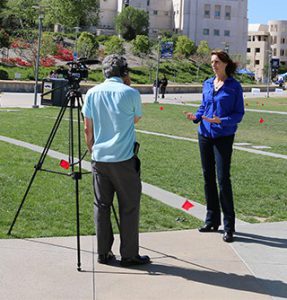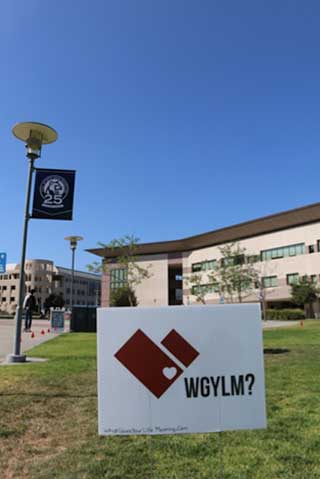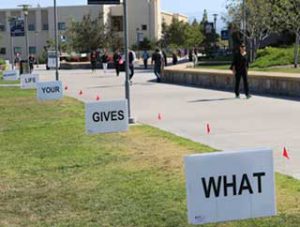
Less than three years after it launched at Cal State San Marcos, the California State University Shiley Institute for Palliative Care is having a profound impact both in the regional and in the nation through a number of initiatives that include a series of online courses for hundreds of health care professionals who are helping thousands of patients lead more comfortable lives.
But if CSUSM has its way, the best has yet to come.
“We’re just getting started,” said Dr. Sharon Hamill, a CSUSM Professor of Psychology who also serves as the Institute’s Faculty Director for the CSUSM campus. “We’re building a comprehensive network within the community to work collaboratively on programs that improve the quality of life not only for patients, but for their families, too.”
The latest effort of faculty involved with the CSU Institute at CSUSM is What Gives Your Life Meaning?, a series of CSUSM events from April 14-28 that includes a resource fair, art projects, a movie night, and several discussions and lectures.
“It is a way to educate students and the community about palliative care, health care choices in general, and the emotional issues involved,” Dr. Hamill said. “When there is an illness in the family, it’s a family affair. It’s not just about the person who has the illness. Knowing about the resources that are available and knowing about your options is vital. It’s also important for students to be educated about palliative care because illness can strike anybody at any time.”
Palliative care is an extra layer of support for a person with serious or chronic illnesses that focuses on providing patients, and their families, with relief from the symptoms and stress of that illness and improving their quality of life.
What palliative care is not is hospice care, though some palliative care patients are living with an incurable disease. Palliative care has been shown to extend the life of a patient, improve his or her quality of life, and reduce stress on caregivers and families.
The CSU Shiley Institute for Palliative Care is a state-wide initiative aimed at providing education for current and future health care professionals as well as community members, ensuring that patients who are living with serious or chronic illness and their families, get the benefits of palliative care. A $750,000 California HealthCare Foundation grant, a $450,000 Archstone Foundation gift, and $1.2 million from San Diego philanthropist Darlene Shiley provided initial funding for the Institute that now includes centers at seven CSU campuses.

Cal State San Marcos has been the home of the Institute since its launch and is a vital partner campus. Projects that CSUSM faculty have been involved in creating include:
- ‘Healing Through Art’, which trains artists and others how to use art to facilitate healing and emotional expression, and which has been delivered at Camp Pendleton to aid Marines suffering from traumatic brain injuries.
- The implementation of inter-professional practice experience for students who are planning for a career in healthcare to experience working collaboratively as a team to learn about providing palliative care to patients and their families.
What Gives Your Life Meaning? has been months in the making.
“What the faculty at CSUSM are doing with What Gives Your Life Meaning? is creating an exciting experience that will be replicable at other campuses to engage students and the community,” said Helen B. McNeal, who serves as the Institute’s Executive Director. “And, as usual, CSUSM is raising the bar for how our other partner campuses can engage students and community members. They are helping the Institute achieve our mission and ensure that everyone understands what palliative care really is and its benefits.”
Among the What Gives Your Life Meaning? activities are:
- Pillow Talk, Pain Relief, and Better End-of-Life Care, an April 14 event featuring Dr. Katherine Pettus, an advocacy officer for the International Association for Hospice and Palliative Care. Dr. Pettus will discuss how honest, courageous conversations between palliative-care teams and patients can alleviate pain on the physical, social, and spiritual levels that many people suffer throughout their disease process. (Academic Hall, Room 102, noon)
- The Public Art Project and Resource Fair on April 23 will include chalk drawings depicting responses to “What Gives Your Life Meaning?” Participants will also be encouraged to create an individual reflection on the topic and it will be incorporated into a permanent display for the campus. The Resource Fair will have 22 agencies presenting information on Palliative Care and healthcare choices. Topics include: palliative care services, hospice, bone marrow, organ donations, and more. Students can make potential connections for volunteer opportunities. (USUB Arcade, 11:30 a.m.)
- My Voice, My Choice. Caroline Boaz, a registered nurse and Nursing School faculty member, will demonstrate the importance of advanced directives, not just for the elderly, but also for students. (Academic Hall, Room 102, noon)

In addition to these activities, CSUSM faculty are working with the Institute to lead the way in educating students and community members through the ambitious, 10-day ‘What Gives Your Life Meaning?’ program at the CSUSM campus.
In Professor Catherine Armas-Matsumoto’s communications course on interviewing, for example, students have been interviewing other students for their thoughts on What Gives Your Life Meaning? Subjects also are asked about their thoughts on advanced directives. “Overwhelmingly, students do not know what an advanced directive is,” Armas-Matsumoto said. “When it is explained to them and when they think about it for a few minutes, they realize that maybe this is something they should look into.”




